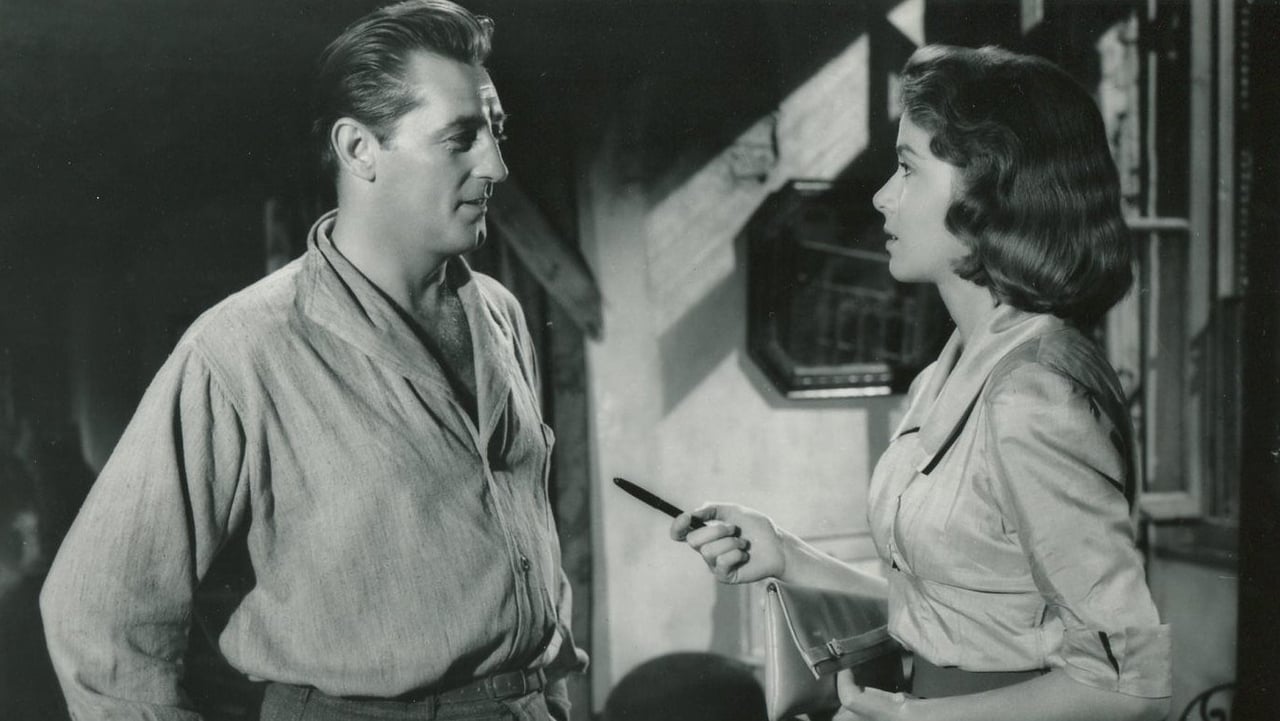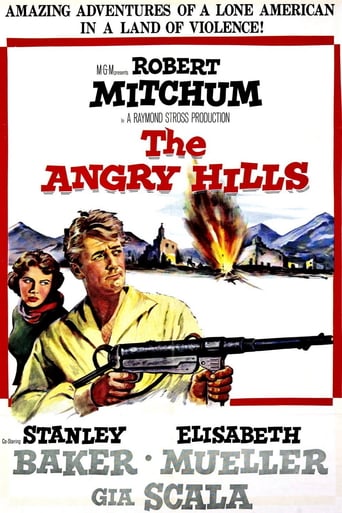SteinMo
What a freaking movie. So many twists and turns. Absolutely intense from start to finish.
Lollivan
It's the kind of movie you'll want to see a second time with someone who hasn't seen it yet, to remember what it was like to watch it for the first time.
Sabah Hensley
This is a dark and sometimes deeply uncomfortable drama
HotToastyRag
It's pretty much his signature for Robert Mitchum to take his shirt off in his movies, but it's not every day you get to see him in the bathtub! "If you're a good girl, I'll let you scrub my back," he jokes when he thinks room service has come into his hotel room. Ladies, you might want to rent The Angry Hills if you want to see him adjusting the faucet with his feet. And where else can you see Robert Mitchum go to a nightclub and hide his eyes in embarrassment as a topless singer dances at his table? It's pretty hilarious, and perhaps the most blatant "Take that, Code!" movie I've ever seen. Maybe an edited version was released in the United States, because I can't imagine a scene like that being released without any uproar from critics and censors. This movie does have a plot, though, besides bathtub scenes and topless scenes. Robert Mitchum gets hold of a list of collaborators to the Greek Resistance, and while he tries to help the Greek people, he also has to dodge Nazis and undercover Nazis who want to steal the list. He doesn't know who he can trust, and when Elisabeth Muller comes into the picture for romance, she just might have an ulterior motive. If you like these types of movies, there's nothing really wrong with this one. It's pretty typical of the genre, but unless you really like underground resistance movies set during WWII, you probably won't come across it.
George Nixon
Having watched this film as a 10/11 year old child in Manchester,UK in 1969, I am intrigued by the very explicit topless dancer scene! I think that I would have remembered this scene, and wonder if it was censored in the UK!! Otherwise not a bad movie, though it was overlong. It would definitely have looked better in colour.Interesting to see so many top rate actors in one film, even though some only had brief roles. Stanley Baker and Gia Scala would appear together in another Greek located film two years later, namely "The Guns Of Navarone"! Personally, I think the look of the film was quite good. The locations, and set dressing,period vehicles looked quite authentic. If I remember correctly in the UK this film was shown on a double bill, with a Tarzan film as the second feature. The Tarzan film was in colour!!
carvalheiro
"The angry hills" (1959) directed by Robert Aldrich is a lovely movie in black and white where Greece is at stake as country considered a little just before a slow penetration and strange German invasion, in which as story of wartime and peaceful purpose it is yet very interesting for appreciating its local culture. Differently understood by a kind of war press correspondent, between urban and rural landscapes and gestures in this land of symbolic Paternon and democratic values, among crossfires of snipers on streets and roads and suddenly opening doors for surviving at any price even with guerrilla peasants help. What it seems in a given scene located in a folkloric local at Athens, during the installation of the special smooth occupation entering with the almost gentle invader, is the naked chest of a dancer in a frontal touch of love, after the exhibition at a stage inside for also mixed origin officers in which the correspondent is there at his table. Obviously in a kind of freedom of the time, by director Aldrich during this movie production - whose screenplay is somehow far away of the book where it came from, without the visit of the writer himself to Greece when he had written his book - concerning the sex-appeal without too much corruption, but maybe more passion in free love in wartime. Where Robert Mitchum in his character of correspondent of war ridicules the prudery and attraction from his colleague nearby his common table at there in this evening. Meanwhile, aside observing this sincerity like of the someone, seemingly enormous like Maria Callas at the time, when still unknown voluntarily or not by the effect of Aldrich direction, who was risking his career here. This is an interesting framework of a mixed population, shared by contradictory feelings about foreigners, when a stranger like him came during the evening bringing hope. The complicated plot is here useful for registering the evidence of difficulties, however also in which a better comprehension for separating the treachery from the betrayed and protecting what is sure and not capable to pass away. Namely, under torture and after giving to the occupant the others civilians, whom not having clearly cooperated with the enemy ; under these circumstances of stressing the strength out of the laws and only by barbarity, for spelling against the will of the local authority. It was like that that the war correspondent it was there between two love affairs, meanwhile and by no means essays escaping from the mountains with some children. But finally by the port of a given island, there is a small ship from a local fisherman for them, when by the window of the police station from the occupants one of his lovers, a beautiful lady, is inside with one of the collaborators, that in a deal accepts intuitively this young and her sacrifice : forgotten the sad affair only for will solving it as account for the resistance, after the war finished.
jaykay-10
The opening developments in this picture are promising in the manner that Hitchcock so often exploited: an innocent bystander finds himself in the wrong place at the wrong time, and is drawn into intrigue of which he has no prior knowledge, and in which he has no interest. But he has something that the villains want - while all he wants is to get out of the situation alive. So far, so good. It is not long, however, before the complications give way to standard action fare, the emphasis now being on hiding, getting away, deciding who is trustworthy - elements used many times in many pictures, some better, some worse. Ultimately, the story disappoints. There are rewarding performances by steely-eyed Stanley Baker, and sweaty, cowardly Theodore Bikel. Robert Mitchum plays the lead role with competence, if not distinction.

